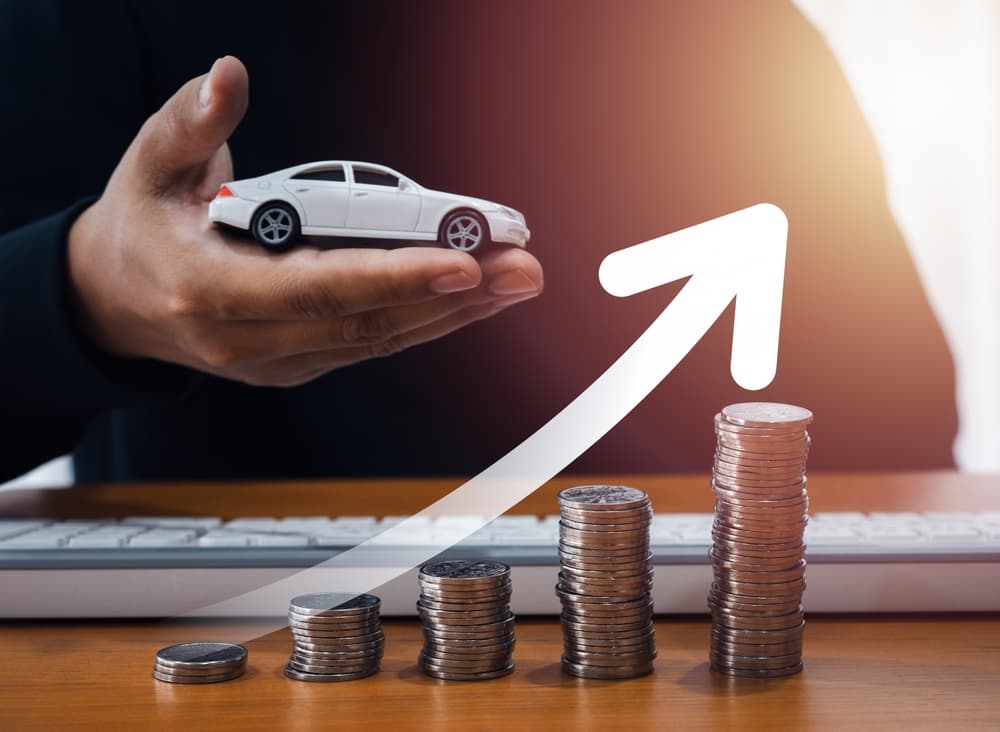If you've ever been in a car accident, you know firsthand the stress, hassle, and potential costs involved. Beyond the initial shock of the collision, you may face expensive vehicle repairs or have to replace your vehicle entirely. You may also have medical bills due to any injuries along with lost income from missing work and other financial losses. Dealing with insurance companies can cause a lot of anxiety and frustration. You may also worry your insurance premiums will increase, even if the accident wasn’t your fault.
In fact, a common question people have after a car accident is, "How much does car insurance go up after an accident?" Being involved in an accident can significantly impact your car insurance premiums, even if someone else caused the crash. Insurance companies view you as a higher risk after an accident, and they often raise rates as a result. However, the specifics depend on several key factors.
Read on to learn of the factors that can affect car insurance rates after an accident and how you can mitigate the potential cost increase. If another party’s negligence or wrongdoing caused the wreck, you may qualify to obtain compensation with the help of an experienced car accident lawyer in your area. If you’re having issues dealing with your own insurance company after an auto accident, a lawyer can help you understand your rights and deal with the insurance company for you to ensure they treat you fairly.
Injured? Get Nicolet.
Factors That Influence Rate Increases
Several key elements come into play when insurers calculate rate increases post-accident. These include:
Fault Determination
One of the most important factors in whether your insurance will go up after an accident is who was at fault. If you were deemed to be at fault, you can expect your premiums to rise, sometimes substantially. After all, the insurance company has had to pay out to cover damages you were responsible for, and they'll want to recoup those costs.
Even if you weren't at fault, your rates may still go up. Some insurers will raise your premiums anytime you're in an accident, regardless of fault. They view your simple involvement as an indicator of higher risk. However, not-at-fault accidents generally lead to much smaller rate hikes than at-fault collisions, or sometimes none at all. It depends on your insurer and your specific policy.
Severity of the Crash
The severity of the accident also plays a big role in premium increases. A minor fender bender will likely have less impact than a major collision with extensive property damage or injuries. The more the insurance company has to pay out in claims, the more they'll want to raise your rates to compensate.
With property damage, the dollar amount is the key factor. A dented bumper that costs $500 to fix is much less serious than a totaled vehicle requiring a $25,000 payout. Of course, insurers will red flag any accident causing injuries and scrutinize it to find ways to reduce what they have to cover or deny the claim altogether. Medical bills can be astronomical, and the insurance company will definitely factor them into your new premiums.
Driving History
Insurance companies also look at your overall driving record when calculating rate hikes. If the accident was a first offense and you have an otherwise spotless history, you may see less of an increase. If you've had previous accidents or a spate of speeding tickets, however, expect higher premiums.
Insurers want to see a consistent pattern of safe driving before they'll cut you a break. Even one prior incident can have an outsized impact. Think of your driving record like a report card; the cleaner it is, the better you'll fare after an accident.
Company Policies
Of course, the outcome also depends on your insurance company and their specific approach to accidents. Some insurers are more forgiving than others. They may have accident forgiveness programs that ignore a first accident, as long as it's minor. They might let one mishap slide if you've been a loyal, accident-free customer for many years.
On the other hand, some companies are quite strict and will raise your rates after any accident, no matter how small. It's important to be familiar with your insurer's surcharge schedule and policies. That way you'll know what to expect and won't be blindsided by huge rate hikes.
Average Rate Increases
So just how much does an accident cause your premiums to climb? It depends, but industry studies show an at-fault accident raises rates by an average of 31%, or $450 a year. A minor incident might trigger a 23% hike, while accidents with major property damage or injuries could push that to 33% or more. It’s not uncommon to see 40% to 150% increases, in some cases. Sometimes, the costs can be even higher.
Of course, these percentages translate to larger dollar amounts for people with more expensive policies. If you started at $250 per month, a 40% increase means an extra $100 each month. A 150% hike would jack up your bill by an almost unbelievable $375. As you can see, major accidents can drastically inflate your insurance costs.
Not-at-Fault Accidents
If you weren't to blame for the accident, you shouldn't see as much of an increase, if any at all. Some insurers won't raise your rates at all for a not-at-fault collision. They should be able to recoup any claims costs from the at-fault driver's insurance company.
However, other insurers will still inflict a small surcharge, often around 10%, for a not-at-fault accident. They see it as an indicator of increased risk, even if you weren't responsible. This can feel unfair, but it's a common industry practice.
Also, keep in mind that even if your insurer doesn't raise your rates, the accident still goes on your record. That means if you shop around for a new policy, other companies may offer you higher quotes than you'd get with a totally clean history. Frustrating, but it's the reality of how insurance works.
Reducing Rate Increases
While accident-related rate hikes can really sting, there are some ways to cushion the blow. One is to take advantage of any accident forgiveness programs your insurer offers. Some will ignore a first accident, as long as it's minor with no injuries. Others may waive surcharges if you've been a customer for a certain number of years with no prior incidents. Read your policy carefully to see if you have this valuable perk.
You can also try to remove an accident from your record by completing traffic school or a defensive driving course. Insurers like to see proactive steps showing that you're working to become a safer driver. They may reward you by reducing surcharges or even preventing a rate hike altogether. It never hurts to ask your insurance agent about this option.
If your insurer does raise your rates more than you can bear, consider shopping around. Just because one company penalizes you heavily doesn't mean they all will. Comparing quotes from multiple insurers may reveal some that weigh your accident less severely. Switching to a new company could reduce your surcharges.
Another strategy is to raise your deductibles. By agreeing to pay more out of pocket for future claims, you're reducing risk for the insurer. They'll often lower your premiums in exchange. For example, bumping your deductible from $250 to $1000 could significantly cut your rate hike. Just make sure you have enough in savings to cover the larger deductible if needed.
Finally, some insurers offer discounts for bundling multiple policies together, like auto and homeowners insurance. Consolidating coverage with one company is more convenient, and it can lead to lower overall rates. Those discounts may take some of the sting out of an accident surcharge. It's worth getting a bundled quote to see how much you could save.
When Will My Insurance Rates Decrease?

An at-fault accident typically stays on your insurance record for three to five years. That means you'll be paying increased premiums the entire time. There's no quick fix to erase the surcharges overnight. The good news is, they won't haunt you forever.
The biggest factor in how long you'll pay higher rates is the severity of the accident. The surcharges for a minor collision often sunset after three years, assuming you've kept a clean record since then. For a major accident, those rate hikes can easily stretch out to five years or sometimes longer. Time will eventually heal the wound to your wallet, but not quickly.
That's why maintaining safe driving habits after an accident is so crucial. If you rack up another crash or a slew of tickets in the meantime, your rates will stay sky-high indefinitely. It's like you're resetting the clock with each new incident. However, if you can demonstrate consistent, claim-free driving for three to five years, you'll slowly see your premiums start to normalize.
Also, as you gain more experience overall, you may see some accident penalties start to fade. Insurers are most wary of inexperienced motorists, and they levy the highest surcharges on younger drivers with less time behind the wheel. But if you're 40 with a decade of mostly claim-free driving under your belt, you're seen as less risky overall than a 20-year-old. A first offense may not hurt you quite as badly.
Get Help from a Car Accident Attorney
Being involved in an accident is stressful enough without the added worries about spiking insurance costs. Unfortunately, significant premium increases are often par for the course, especially if you're found at fault. It's important to review your policy carefully and discuss any surcharges with your agent. An attorney can help you understand your rights and make sure the insurance company isn't unfairly penalizing you.
At Nicolet Law Accident & Injury Lawyers, we've helped countless car accident victims navigate the complexities of insurance claims and premium hikes. We know the severe financial impact a crash can have, beyond just the initial vehicle damage and medical bills. Our team will aggressively advocate for you with the insurance companies and make sure your rights are protected.
If you've been in an accident, don't hesitate to contact our experienced personal injury attorneys for a free consultation. We'll review your case and advise you on the best path forward to minimize financial hardships and get your life back on track. Dealing with the aftermath of a crash is hard enough. Let us shoulder some of the burden and fight for the justice you deserve.
